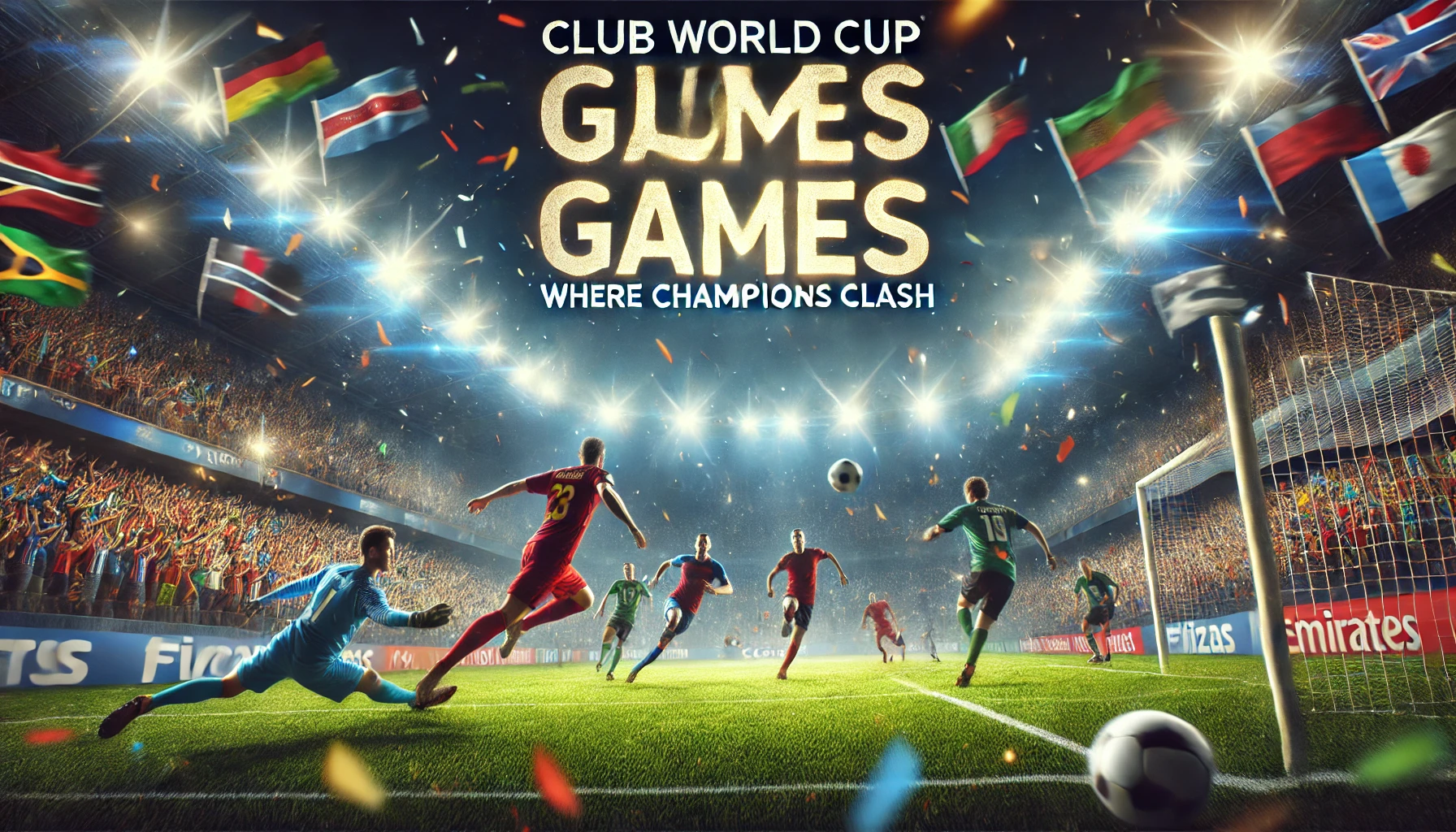Blogs
Club World Cup Games, Where Champions Clash

Summary
Club World Cup games bring together the finest football clubs from every continent in a tournament that crowns the ultimate global champion. These matches are more than just games—they’re dramatic showdowns rich in talent, history, and pride. This article explores the history, format, iconic moments, and future of Club World Cup games, diving deep into why they matter to fans, players, and the sport itself.
Introduction to Club World Cup Games
Club World Cup games have become one of the most anticipated events in international club football. Organized by FIFA, this tournament pits the champions of each continental competition against each other, offering a rare opportunity to see how clubs from different footballing traditions stack up. From Europe’s tactical giants to South America’s passionate squads, the tournament delivers diversity, unpredictability, and high-stakes drama.

A Brief History of the Club World Cup
The idea behind club world competitions dates back to the 20th century, but the modern FIFA Club World Cup officially started in 2000. Initially featuring a few teams, the competition evolved through the years and solidified its place on the global football calendar by 2005.
Evolution Over Time
- 2000: The inaugural tournament was held in Brazil, with Corinthians taking the first title.
- 2005–2019: Held annually with a seven-team format.
- 2025 Update: FIFA announced a major expansion to 32 teams, set to begin with the 2025 edition in the United States, giving the tournament a World Cup-style format.
The Format of Club World Cup Games
Past and Present Formats
The tournament has typically featured the following:
- UEFA Champions League winner (Europe)
- Copa Libertadores winner (South America)
- AFC Champions League winner (Asia)
- CONCACAF Champions League winner (North America)
- CAF Champions League winner (Africa)
- OFC Champions League winner (Oceania)
- Host nation’s league champion
These teams compete in a knockout-style competition with quarter-finals, semi-finals, and a final.
New Format in 2025
FIFA is expanding the competition to a 32-team format similar to the FIFA World Cup. Teams will be divided into groups, and top-performing clubs will move into the knockout stage. This change aims to elevate the competitiveness and commercial appeal of the Club World Cup games.
The Global Impact of Club World Cup Games
Club World Cup games provide a platform for clubs from less prominent footballing regions to showcase their talent on a global stage. While European and South American teams have dominated, clubs from Asia, Africa, and North America have had strong showings, breaking stereotypes and increasing competitiveness.
Notable Examples
- TP Mazembe (2010): Reached the final as an African side, surprising the world.
- Kashima Antlers (2016): Gave Real Madrid a scare in the final.
- Al Hilal and Monterrey: Regular deep runs into the semi-finals.
Legendary Moments in Club World Cup History
Corinthians vs. Vasco da Gama (2000 Final)
The all-Brazilian final went down to penalties in front of a roaring home crowd, marking a symbolic start for the tournament.
Barcelona’s Dominance (2009, 2011, 2015)
Led by Lionel Messi, Barcelona made Club World Cup games a spectacle of elegance and dominance.
Bayern Munich’s 2020 Triumph
Completing a historic sextuple, Bayern Munich confirmed their global dominance with a win in Qatar.
The Players Who Shined in Club World Cup Games
Some of the world’s best players have graced the Club World Cup stage, using it as a platform to show their brilliance or cement legacies.
- Lionel Messi: One of the top scorers in Club World Cup games history.
- Cristiano Ronaldo: Delivered crucial goals for Manchester United and Real Madrid.
- Robert Lewandowski: Starred in Bayern Munich’s 2020 victory.
- Mohamed Salah: A fan-favorite during Liverpool’s 2019 campaign.
These performances have helped elevate the tournament’s prestige over time.
The Significance for Clubs and Players
Club World Cup games offer more than a trophy. For players, it’s a shot at international recognition. For clubs, it means boosting their brand globally and attracting talent.
Revenue and Branding
Participation can significantly increase merchandise sales, sponsorship opportunities, and digital reach for clubs—especially those outside Europe.
Club Legacy
Winning the Club World Cup puts a team in an elite category of global champions, which matters to fans and club histories alike.
How Fans Experience Club World Cup Games
Global Broadcasts
FIFA ensures that matches are broadcasted globally, giving fans across continents access to games at convenient times.
Local Engagement
Host countries benefit from a massive influx of tourism, and local fans get to witness world-class football up close, which often boosts grassroots enthusiasm.
Club World Cup Games vs. UEFA Champions League
While the UEFA Champions League is often seen as the pinnacle of club competition, the Club World Cup introduces a unique twist by involving champions from all over the world.
Key Differences:
- Scope: Club World Cup is global; UCL is European.
- Intensity: Fewer games in the Club World Cup, but all high-stakes.
- Prestige: Growing for the Club World Cup, still trailing behind UCL.
Still, a Club World Cup victory can be a crowning moment even for UCL winners.
Challenges and Criticism
Despite its ambitions, Club World Cup games have faced criticisms.
Common Critiques
- Timing: Often played mid-season, leading to fixture congestion.
- Dominance: European teams usually overpower others.
- Fan Engagement: Until the recent revamp, many fans viewed it as a glorified exhibition.
The 2025 expansion is intended to address these issues and breathe new life into the competition.
Looking Ahead: The Future of Club World Cup Games
With FIFA committing to a 32-team format from 2025, the tournament could rival the World Cup in spectacle. Clubs from every continent will be involved in meaningful matches, generating new rivalries, underdog stories, and a deeper appreciation of the global game.
Predictions and Expectations
- More competitive balance.
- Rise of African and Asian clubs due to better preparation and investment.
- Major TV deals and global sponsorships will increase visibility.
- Club legends will be made on new stages.
How to Watch Club World Cup Games
Club World Cup games are typically streamed or televised on networks such as:
- FIFA+
- Fox Sports
- BBC and ITV (UK)
- DAZN (select regions)
Fans can also catch highlights and behind-the-scenes content on official FIFA channels and club YouTube platforms.
FAQs About Club World Cup Games
Q: When is the next Club World Cup?
A: The expanded edition will begin in June 2025, hosted by the United States.
Q: How are teams selected?
A: Clubs qualify by winning their continental competitions, and some spots are filled based on club rankings and historical performance.
Q: Do players take it seriously?
A: Yes, especially as it adds an international title to their club and personal achievements.
Q: Which club has won the most titles?
A: Real Madrid holds the record with five Club World Cup titles.
Final Thoughts
Club World Cup games are evolving into must-watch events for football fans around the world. As the tournament expands and invites more top-tier clubs into the fold, the quality of competition and global interest will only grow. Whether you’re a die-hard fan or a casual viewer, these games are your front-row seat to the international stage of club football.

-

 Resources4 years ago
Resources4 years agoWhy Companies Must Adopt Digital Documents
-

 Resources3 years ago
Resources3 years agoA Guide to Pickleball: The Latest, Greatest Sport You Might Not Know, But Should!
-

 Resources2 months ago
Resources2 months agoTOP 154 Niche Sites to Submit a Guest Post for Free in 2025
-

 Resources3 months ago
Resources3 months ago50 Best AI Free Tools in 2025 (Tried & Tested)